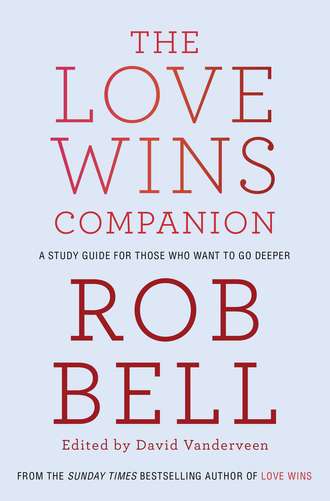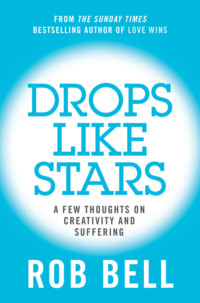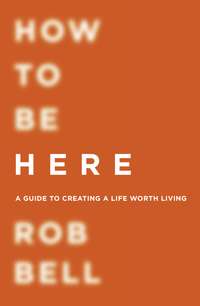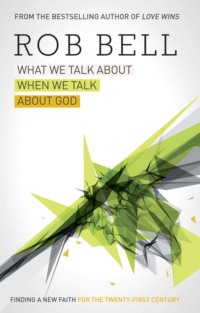
Полная версия
The Love Wins Companion: A Study Guide For Those Who Want to Go Deeper

The
Love Wins
Companion
A Study Guide for
Those Who Want
to Go Deeper
ROB BELL
Edited By David Vanderveen

Contents
Cover
Title Page
Foreword - Do Not Be Afraid by Jack Heaslip
Preface by Rob Bell
How to Use This Companion by David Vanderveen
Chapter One - What About the Flat Tire?
Overview by Rob Bell
Going Deeper by David Vanderveen
Bible Study: A God Who Loves Questions
Group Exercise: Knowing Your Story
Discussion Questions
Reading: Questioning God by David Dark
Reading: The Temptation of Religious Success by Oswald Chambers
Chapter Two - Here Is the New There
Overview by Rob Bell
Going Deeper by David Vanderveen
Bible Study: Earthly Heavenly Visions
Discussion Questions
Reading: Going to Heaven? by N. T. Wright
Chapter Three - Hell
Overview by Rob Bell
Going Deeper by David Vanderveen
Bible Study: (Almost) Everything the Bible Says About Hell
Group Exercise: The Hell Download
Discussion Questions
Reading: Becoming a Deep Reader of Scripture by Clayton Libolt
Reading: Hell on Earth by Shayne Moore
Chapter Four - Does God Get What God Wants?
Overview by Rob Bell
Going Deeper by David Vanderveen
Bible Study: “All Things”
Discussion Questions
Reading: The Secret by Peter Rollins
Reading: What Is Et ernal Life? by Pope Benedict XVI
Chapter Five - Dying to Live
Overview by Rob Bell
Going Deeper by David Vanderveen
Bible Study: The Metaphorical Riches of the Cross
Group Exercise: What Is the Gospel?
Discussion Questions
Reading: Melchizedek, the Magi, and Isa al-Masi by Glenn Parrish
Reading: Stingy Orthodoxy or Generous Orthodoxy? by Richard J. Mouw
Reading: Confession by Donald Miller
Chapter Six - There Are Rocks Everywhere
Overview by Rob Bell
Going Deeper by David Vanderveen
Bible Study: The Cosmic Christ
Group Exercise: Where Are the Rocks?
Discussion Questions
Reading: Playing with Rocks by Jack Heaslip
Reading: All Right. You Can Come In by Anne Lamott
Chapter Seven - The Good News Is Better Than That
Overview by Rob Bell
Going Deeper by David Vanderveen
Bible Study: Telling the Right Story
Discussion Questions
Reading: Trusting the Story God Is Telling by Cathleen Falsani
Chapter Eight - The End Is Here
Overview by Rob Bell
Going Deeper by David Vanderveen
Bible Study: Parables of Urgency
Discussion Questions
Reading - Do You Really Believe Anything Happens After You Die? by Frederick Buechner
The Wide Road Called Orthodoxy Selections from Historic Christian Teachers on Last Things
Q&A with Rob Bell: An Interview by David Vanderveen
Contributors
Permissions
About the Author
Copyright
About the Publisher
Foreword Do Not Be Afraid
by Jack Heaslip
Do you know how many times the phrase “Do not be afraid” appears in the Bible? One website says it is 365 times. I prefer to say “lots of times.”
What has fear to do with a book on love? God’s love at that? Even before Love Wins was released, fear was at work. People had opinions about a book they hadn’t read. I was told I needed to be skeptical, suspicious, nervous, critical, afraid, but mostly “cautious.” Caution must be good, mustn’t it? The trouble is that caution can be fear dressed up to look right and proper and maybe a shade holy.
Fear also could be heard in the questions being asked. Is it okay to question God like that? Is he destroying faith? Why doesn’t he respect our tradition, our catechism?
If you are in a group, look around and see how many people show signs of fear and suspicion. Look in a mirror for the same signs.
Jesus said, “Do not be afraid.” Angels said, “Do not be afraid.” God said it too.
After all these things, this word of God came to Abram in a vision: “Don’t be afraid, Abram. I’m your shield. Your reward will be grand.” (Gen. 15:1, MSG)
But the angel assured her, “Mary, you have nothing to fear. God has a surprise for you.” (Luke 1:30, MSG)
But Jesus was quick to comfort them. “Courage, it’s me. Don’t be afraid.” (Matt. 14:27, MSG)
So why shouldn’t we be afraid? Because God can be trusted.
So with a God who can be trusted we can head off into new territory or a fresh experience of old territory. We can ask questions. We do not need to be afraid.
Because we can trust God and not be afraid, we are then free to love. Love is the bottom line!
Everyone who loves is born of God and experiences a relationship with God. (1 John 4:7, MSG)
It is like love meeting love. Our shallow attempts at loving are embraced by God’s mighty love. That, for me, is powerful stuff. With that sort of confidence we can really go for the experience and the understanding of God.
There is no room in love for fear. Well-formed love banishes fear. Since fear is crippling, a fearful life—fear of death, fear of judgment—is one not yet fully formed in love. (1 John 4:18, MSG)
God is love! It’s that simple, that profound.
Paul believed this. He gave the Corinthians a wonderful description of what our religion should involve and what it should look like: “For in Christ, neither our most conscientious religion nor disregard of religion amounts to anything. What matters is something far more interior: faith expressed in love” (Gal. 5:6, MSG).
Isn’t that brilliant? Religion and nonreligion are firmly put in their place by God’s love. And our intellects are given something to work on. Paul encourages us to think! It is okay to think! Sometimes our little gray cells are put on the back burner by those who want us to follow a faith they prescribe. It is good to unwrap a package. How can we receive the gift if we don’t delve a bit?
Do not be afraid. God can be trusted. You are free to love, to explore, to ask questions, to think. That is the invitation Rob Bell puts before us in Love Wins and now in The Love Wins Companion. We are invited to step outside of the boat and draw closer to the one who calls us and wants to be known. Do not be afraid. God appreciates our efforts and smiles at our failings. He loves our humor when we lighten our load and when we enjoy the presence of his Spirit in our lives. God is willing to be found—by anyone who is looking. That’s good news. And the password is love.
Preface
by Rob Bell
I’m thrilled that you are interested in going deeper into the ideas I present in Love Wins. A couple of thoughts before we get going.
First, some words out there in our culture have incredibly heavy emotional attachments to them, words like heaven, hell, judgment, salvation. You throw these words into a conversation, and people have strong opinions and ideas whether for or against, negative or positive. This is true especially when it comes to the Christian faith, and specifically when it comes to where people are with God, who has a relationship with God, who doesn’t, who’s a Christian, who’s not, who’s going to heaven, who’s going to hell.
One of the things that drives this book is my desire to simply say, “Here’s what the Bible says.” If some people are really, really passionate about a particular perspective, I want to know where they got that from. So when it comes to heaven and hell and judgment, what I’ve tried to do in the book is lay out what the Bible actually says, what Jesus said, and then, conversely, what Jesus didn’t say.
I believe that God loves everybody. And I believe that the heart of the Christian faith is this God who loves everybody, this Jesus who came to show us this love, give us this love, and invite us into this love. So, from my perspective, the Christian faith at its core is an experience of the love of God through this Jesus, who insists that God loves everybody, everywhere. As you read through this Companion, as you wrestle with the questions and go further into the ideas, as you look at this passage and that passage and that story, and as you recount your own experience or reflections, my wish is to create the space where you can meet this God and experience this God’s love.
I’m fascinated when Jesus talks about how he’s water. It’s hard to build a systematic theology around water. Try building a denomination around water; it’s very fuzzy and nebulous and ambiguous—unless, of course, you’re thirsty. Then you know exactly what the water is.
Or when Jesus says he’s light. Light can be hard to get your hands around; it can be hard to quantify or systematize—unless you know you’re far from home, and then light shows you how to return to the place from which you came.
Jesus speaks in metaphors and parables, because ultimately he comes to bring us a living, breathing experience of the love of God right here, right now. At the heart of this book is this simple, beautiful, compelling declaration that this love wins. So I hope this guide helps take you to places you haven’t been before, places that are thrilling and convicting, that fill you with wonder and awe. May the peace of God be with you the whole way.
When my publisher shared with me the idea for this companion guide and asked if I could suggest who should help put it together, my first thought was my friend of twenty years Dave Vanderveen. I was of course thrilled when he said he’d do it and then continually surprised with the fresh insights and people and ideas he has brought to this project.
We have found that a lot of people are preoccupied with the question, “Is there life after death?” That’s a good question, an interesting question, and one that has received a good deal of speculation and discussion. But that isn’t the question that Jesus came to answer.
He came to answer a better, more urgent, more pressing question: “Is there life before death?”
And to this question Jesus repeatedly, emphatically answered, “Yes!”
That insistence of Jesus—that we can have full, overflowing, vibrant, pulsating, dynamic life right now—is what Love Wins is about and it’s what this companion guide is about.
What’s possible right now?
What is God doing in the world right here in our midst?
What does the resurrection life Jesus gives us look like at this moment in time?
My hope is that as you discuss Love Wins you will find yourself returning to that question and that insistence over and over and over again. My prayer is that you are not sidetracked for any significant amount of time with questions that we cannot answer, because we are speculating about things that haven’t happened. My desire is that the book and now this companion will produce a profound sense of urgency and immediacy that there really is bread for the hungry and water for the thirsty and light for those who need to find their way home.
So here’s to the discussion.
Enjoy.
And now, a word from Dave.
How to Use This Companion
by David Vanderveen
Some of the Pharisees said, “Obviously, this man can’t be from God. He doesn’t keep the Sabbath.” . . .
The man replied, “This is amazing! You claim to know nothing about him, but the fact is, he opened my eyes! It’s well known that God isn’t at the beck and call of sinners, but listens carefully to anyone who lives in reverence and does his will. That someone opened the eyes of a man born blind has never been heard of—ever. If this man didn’t come from God, he wouldn’t be able to do anything.” . . .
Jesus then said, “I came into the world to bring everything into the clear light of day, making all the distinctions clear, so that those who have never seen will see, and those who have made a great pretense of seeing will be exposed as blind.” (John 9:16, 30–33, 39, MSG)
When the blind are being healed, arguments about keeping the Sabbath seem absurd. They miss the point entirely. Jesus’s words are clear about those who cannot see the light, who refuse to look away from their own interests and their own doctrines when the good news shows itself in surprising ways among us.
We all wear filters, lenses, and, in some cases, blinders when we read the Bible. No one experiences the gospel message in a vacuum. When a book appears that generates dramatic and enthusiastic interest about the underlying truth of the good news of Jesus, it demands our attention. We need to make sure we are not like those pretending to see, but are actually blind. Being open to investigating and exploring what is before us helps prevent blindness.
The problem many of us face is how to really listen—particularly as we become more comfortable with the patterns and boundaries through which we interpret the world around us. Are we truly open to God’s surprises? Will we let God confront us in gut-wrenching ways with his good news? Will we let God break through our own ideas about who God is and to speak to us in fresh ways?
The most important thing for reading Love Wins and The Love Wins Companion isn’t discovering the “right” beliefs about Christianity or salvation. The important thing is seriously to engage the material in the books, really attempt to read them without running the ideas through the blinders you may have, before trying to discern what the Holy Spirit may be saying through these words. Those blinders might have come from a specific Christian tradition or from another faith or no faith, whether you call yourself a believer, agnostic, atheist, or just someone looking for ideas. Dive into Love Wins and look around. Engage the ideas and voices in The Love Wins Companion. They are for those who wish to see.
We recognize that people will have different purposes for reading this companion to Love Wins. Some will want to explore more deeply the ideas in Love Wins as individuals; some will want to do the same in a small group or even in a class. We have tried to make this as open-ended and flexible as possible for all these uses. Each chapter from the original book has a corresponding section in this companion that includes an overview and introduction by Rob Bell; a general introduction of the new material by me; Bible studies and exercises for study; discussion questions for groups; and, finally, related “readings” of articles, blogs, book excerpts, and interviews to explore more deeply the ideas from the original chapter.
To get the most out of this companion, we recommend following these principles to avoid “blindness” or unnecessary division:
1 Don’t be overly focused on ending up with the right answer. This worry often hinders our ability to hear the real question and wrestle with the issues. Relax, drop your preconceived objections, and try to respond directly just to the text in front of you. The goal of both books is for you to understand what the Bible actually teaches. In the end, you might not agree with everything these books say, but we want to make sure you truly hear the questions and ideas first in case God has something new to say to you.
2 Focus on loving the people you are discussing these issues with—regardless of their opinion or yours. This is the explicit teaching of scripture. “No matter what I say, what I believe, and what I do, I’m bankrupt without love” (1 Cor. 13:3, MSG).
3 Recognize that we all read the Bible through a lens and not in a vacuum. No one “just reads the Bible.” The church has been wrestling with these texts for two thousand years. There are dozens of major traditions and hundreds of minor ones that all read the biblical texts in certain ways. We are not saying the Bible is unclear or impossible to understand. But we are saying that you have filters that shape how you are reading the Bible. If you haven’t identified your lenses and filters, take some time to understand your own background, biases, and the history of the ideas that have shaped your own thought.
4 Make sure you distinguish ideas from the people who are expressing those ideas (including your own). Candid and strong discussion is powerful and beneficial when we don’t attack the people we are talking with. Debate the worthiness of the idea without infringing on the worth of the person.
5 Make peace with the reality that good Christians can disagree on important matters. This is another reason why it is important to separate critical comments about ideas from critical comments about people. Very bright and very devout people have a vast range of orthodox opinions that don’t always align.
6 Study the history of the idea you are defending. Many people are shocked to discover that what they thought was ancient Christian orthodoxy turns out to be a relatively recent development in the church or, conversely, what they considered a problem doctrine has been a standard orthodox view for centuries. That is why it is helpful to ask: How old is the idea in the history of the Christian tradition? Where did it originate? What was it responding to? What were the original arguments disputing it? Understanding these contextual issues allows us to appreciate both the limits of an idea and how adaptive doctrines have been to the issues and context of the church throughout the centuries.
Jesus specialized in taking religious people’s understandings about God and how everything works and then turning them on their heads. He wanted people to see that God was doing something new. In that vein, Love Wins stretches many of our preconceived ideas about Christianity for those both inside and outside the faith. Rob does this mostly by getting us to pay attention to what Jesus and his followers actually said. Embracing the biblical text with as much separation from our preexisting ideas and experiences as possible may offer some surprises about Jesus’s good news. Perhaps God is offering a bigger love than many of us have ever imagined.
Chapter One What About the Flat Tire?
Overview by Rob Bell
Over the years I have met many people who are fascinated, compelled, or drawn to Jesus, but some reason or obstacle keeps them away. They may have heard from a Christian, “This is how it is, period, end of discussion. The Bible says it, so that settles it.” Or they might have been taught that to follow Jesus, they had to go down a certain road and believe certain things, some of which they found problematic. What I’m interested in in this chapter is the power of questioning and the experience of solidarity in finding you’re not alone—of always wondering, “But what about that?” and then finding out, “Oh, other people feel the same way.”
My interest here is that you get loosened up with the questions, that the questions pull out of you, “You’re right. That doesn’t make sense” or “You’re right. I’ve always had a problem with that explanation.” It’s okay. There should be no fear in the questioning and no hesitation in the asking. We can go there—that’s the power.
And the biblical tradition is actually filled with questions, all the way to Jesus on the cross: “My God, my God, why have you forsaken me?” Questions are actually one of the ways we meet the divine. My hope is that somewhere in here you find your own questions and you learn that you aren’t alone.
Going Deeper by David Vanderveen
Many readers of chapter 1 of Love Wins are a little taken back by all the questions Rob throws at them about what it means to be “saved.” Rob is not trying to deny or criticize what Christians believe, but to reveal that our present understanding does not explain everything. Some churches suggest there is a specific process for getting “saved.” In this chapter, Rob explores a wide range of those techniques, some of which conflict, as well as a long list of ways that Jesus told people they were accepted. Our beliefs about God, Jesus, and the meaning of Jesus’s death and resurrection need to deepen in order for us to grasp more fully what the Bible means by “saved.”
Rob is not the first to raise these issues. In a 1997 interview of evangelist Billy Graham by televangelist Robert Schuller of the “Hour of Power,”[1] the conversation was surprisingly broader than some Christians imagined it should be:
Schuller: Tell me, what do you think is the future of Christianity?
Graham: . . . I think everybody that loves Christ, or knows Christ, whether they’re conscious of it or not, they’re members of the Body of Christ. And I don’t think that we’re going to see a great sweeping revival that will turn the whole world to Christ at any time. I think James answered that, the Apostle James in the first council in Jerusalem, when he said that God’s purpose for this age is to call out a people for His name. And that’s what God is doing today. He’s calling people out of the world for His name, whether they come from the Muslim world or the Buddhist world or the Christian world or the nonbelieving world, they are members of the Body of Christ, because they’ve been called by God. They may not even know the name of Jesus, but they know in their hearts that they need something that they don’t have, and they turn to the only light that they have, and I think that they are saved, and that they’re going to be with us in heaven.
Schuller: What I hear you saying is that it’s possible for Jesus Christ to come into human hearts and souls and lives, even if they’ve been born in darkness and have never had exposure to the Bible. Is that a correct interpretation of what you’re saying?
Graham: Yes, it is, because I believe that. I’ve met people in various parts of the world in tribal situations who have never seen a Bible or heard about a Bible and never heard of Jesus, but they’ve believed in their hearts that there was a God, and they’ve tried to live a life that was quite apart from the surrounding community in which they lived.
Schuller: I’m so thrilled to hear you say this. There’s a wideness in God’s mercy.
Graham: There is. There definitely is.
We should not be surprised that one of the greatest evangelists in the history of the church thought along these lines. As someone who had spent a career presenting the gospel to non-Christians, Graham had to think deeply and thoroughly about the logic of God’s salvation. So should we.
We have included an excerpt from Oswald Chambers’s My Utmost for His Highest as another example and model of a past Christian teacher who offers counsel. In “The Temptation of Religious Success,” Chambers describes the danger of religious conformity and taking pride in Christian success. Instead, he advises that we try to seek only the Lord’s approval. This is good, but tough advice.
People have very personal stories about how they came to accept Jesus or why they’ve rejected him. The questions, Bible studies, exercises, and readings in this chapter are designed to dig into the various claims different Christian groups make about what salvation is and the variety of ways to accomplish it, allowing you to explore more fully what you think the Bible teaches on this core issue. Before the group exercise and discussion questions, we have included a Bible study showcasing just how much the Bible embraces and models the practice of asking questions; this is followed by David Dark’s reflections on the theme of his book, The Sacredness of Questioning Everything, which we excerpt.







